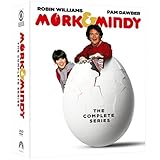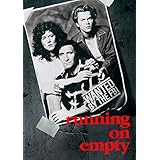A positive aspect of national and global dystopia arguably increasing in 2014 is that this increases the value of escapist fare that is a theme in the Unreal TV manifesto titled
"Reality Stinks." The idea is that the worse things are in the real world, the more we need a break in the form of entertainment that allows shutting all that out.
We are fortunate that the themes that several home-video distributors followed this year showed great love for classic films, shows, and a special superhero. Every link in each section devoted to these releases is to the Unreal TV review of that DVD or Blu-ray set.
75th Anniversary Celebration of Batman

Like Superman and the Dark Knight/Caped Crusader on a good day, Warner Home Entertainment and Warner Archive teamed up in 2014 to celebrate the 75th anniversary of the creation of Batman. The centerpieces of this tribute were the painfully long awaited November, 11 2014 DVD and BD special edition releases of the campy Adam West series that batboys know as '66. The good people at Warner Home Entertainment have also issued several less expensive versions of these sets for intermediate fans and bat curious folks.
Although the Unreal TV video library does not currently include any '66 set, hopes remain high for getting one of the special editions. An August 2014
"candid ode" provides thoughts regarding these releases.
Archive focused its celebration of this character who almost certainly will receive a centennial (and perhaps bicentennial) tribute on BD releases of uber-awesome highly stylized recent animated Batman series. These include
S1 and
S2 of the terrifically campy "Batman: The Brave and the Bold" that typically teams the Caped Crusader (a.k.a. "Bats" in this one) with a different fellow super friend or team of said meta-humans to battle the member of the Legion of Doom who is currently stirring up trouble.
The Archive BD releases of
Part One and
Part Two of the first season of "Beware the Batman" are much more Dark Knight than Caped Crusader and include heavy elements of the Christopher Nolan "Dark Knight" trilogy. The visually darker and more stark animation style in this one compared to "Brave" further reflect this contrast.
The Great War Centennial

Terrific purveyor of British films and television series BFS Entertainment on this side of the pond marks the anniversary of an event that is far darker than any adventure in which Bruce Wayne has become involved in his 75 years. A series of fictional and documentary films and television productions looks at The Great War (a.k.a. World War I) and its aftermath.
The trilogy of documentaries grouped under the title
"First World War Centenary Collection" provides extensive detail about that conflict. The film
"The Trench" starring Craig, Daniel Craig provides a sense of life in said ditches in the days leading up to the Battle of the Somme. The Australian film
"An Accidental Soldier" is an equally good production that tells the tale of the titular warrior unilaterally calling it quits during this war.
The
first season (a.k.a. first series) of the BBC drama "The Village" depicts the
impact of the war on the titular burg during the years in which the
fighting occurs.
Finally, the
first season (a.k.a. first series) of fellow BBC drama "When the Boat Comes In" focuses on the challenges that war veteran Jack Ford, the Seaton family, and the others in their mining/ship building community face in the years immediately following WWI.
Classic Warner Archive Tribute Sets

Archive continued its excellent track record regarding DVD releases of classic and cult films from the Golden Age of Hollywood in 2014. One theme of these releases was regularly focusing on a particular member of Hollywood royalty seemingly at least one month. These screen legends included Joan Crawford (of course), Olivia DeHavilland, and James Cagney. A good rule of thumb is that anyone you heard of who was under contract with Warner in the '30s
or '40s received this star treatment.
Even more notably, Archive awesomely restored a plethora of (mostly musical) films and released them on BD. Any doubt regarding the results of providing films that were produced long before hi-def was even conceived of on BD dissolves on watching the first minutes of any of these films.
These productions further typically offer truly special features in the forms of terrific "making-of" documentaries and vintage material that includes shorts and cartoons from the era of the film.
The musicals that Archive brought to life in 2014 included
"Yankee Doodle Dandy," "Hit the Deck," "Billy Rose's Jumbo," and
"Pete Kelly's Blues."
Resurgence of 'Happy Days' Series

The nostalgic aspect of this brief stroll down memory lane and a desire to end it on a happy (no pun intended) note, requires wrapping up this recap of 2014 home-video releases with a look at CBS Home Entertainment resuming its releases of DVD sets of the '70s sitcom set in the '50s and the '60s "Happy Days." The scope of this "renaissance" included the uber-popular "Days" spinoffs that, along with "Days" made Tuesdays the favorite night of television for 1-12 aged kids across the country.
Several years after seemingly stopping these releases with S4 of "Days," CBS released
S5 in May 2014 and
S6 a few months later. The "Days" spinoff
"Joanie Loves Chachi" starring dreamy '80s idol Scott Baio also hit actual and virtual store shelves this year.
The highest profile "Days" releases of 2014 were the
CS and S4 sets of the spinoff "Mork and Mindy," which starred Robin Williams. A nice aspect of these releases several years after the release of S3 was that there was NO hint that these sets were designed to exploit the August 2014 death of Williams. A truly heartfelt
post on Williams soon after his passing expressed the nature of his unique awesomeness.
CBS rounded out this group of 2014 "Days" releases with
S7 and
S8 sets of "Laverne and Shirley."
Looking Ahead
Although keeping specifics close to its proverbial vest, Archive is expressing intense enthusiasm regarding exciting cult titles for 2015. Pure speculation creates hopes for a release of the Hanna-Barbera cartoon "Yogi's Space Race."
It is an even safer bet that Archive will continue digging long-term favorites and wonderfully obscure gems from its seemingly infinite vault full of titles.
Similarly, BFS will introduce truly terrific British classics, which likely will include shows that inspire U.S. programs.
2015 definitely will be a "Trek" heavy year for Unreal TV. Largesse related to CBS cleaning its closets is netting this site BD sets of all four seasons of "Star Trek: Enterprise" and three seasons of "Star Trek: The Next Generation." The hope regarding "Trek" is that "Star Trek: Voyager" and "Star Trek: Deep Space Nine" will join the aforementioned two series and the original series of feature films in getting BD releases.
Standard Signoff
Anyone with questions or comments regarding any of the scads o' titles that this post discusses (or any other releases) is strongly encouraged to
email me. You can also connect on Twitter via @tvdvdguy.



















